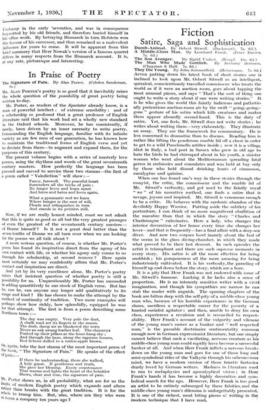In Praise of Poetry
Ma. ALAN PORTER'S poetry is so good that it inevitably raises the whole question of the possibility of great poetry being written to-day.
Mr. Porter, as readers of the Spectator already know, is a man of powerful intellect : of extreme sensibility : and of a scholarship so profound that a great professor of English literature said that his work had set a wholly new standard ill the Oxford schools. Moreover, he has consistently, if rarely, been driven by an inner necessity to write poetry. Commanding the English language, familiar with its infinite variety as are few men of our generation, he has known how to maintain the traditional forms of English verse and yet to deviate from them—to augment and expand them, for the purposes of this century.
The present volume begins with a series of masterly love poems, using the rhythms and words of the great seventeenth century masters. How perfectly the language has been pressed and carved to service these two stanzas—the first of a poem called " Valediction" will show:— Fancy, farewell. The peaceful heart Surrenders all the tricks of pain No longer loves and leaps apart And loves and hates and loves again. What a gymnastic reel we learn Where hunger is the root of will, Pleads and relinquishes in turn And stands in its petition still.
Now, if we are really honest minded, must we not admit that this is quite as good as all but the very greatest passages of even the greatest of the seventeenth century masters— of Donne himself ? Is it not a great deal better than the seven-tenths of Donne we all turn over when we are looking for the poems we all talk about ?
A more serious question, of course, is whether Mr. Porter's poem has found its inspiration direct from the agony of his own contact with life, or whether his agony only comes to us through his scholarship, at second remove ? Here again most certainly we may confidently affirm that Mr. Porter's contact and inspiration are direct.
And yet by its very excellence alone, Mr. Porter's poetry raises that insistent question of whether poetry is still a possibility for us. Unquestionably Mr. Porter has succeeded in adding quantitively to our stock of English verse. But has he, can he, can anyone any longer add qualitatively to its range and kind ? He has chosen to make the attempt by the method of continuity of tradition. Two more examples will perhaps show how richly, how splendidly, equipped he was for that attempt. The first is from a poem describing some Northern town :—
The day was empty. Very pale the dust, A chalk road set its fingers at the moors. The drab, damp air so blanketed the town Never an oak swung leather leaf. The chimneys Pushed up their pillars at the loose-hung sky And through the haze, along the ragstone houses, Red lichens dulled to a rotten-apple brown.
Or, again, take the last stanza of the most important poem of
the book, " The Signature of Pain." lie speaks of the effect of pain:— If there be understanding, there she walked, A holy guest. If gentleness and truth, She gave her blessing. Every countenance That warms and lights the heart of the beholder Mews, clear and true, the signature of pain.
Mr. Porter shows us,. in all probability, what are for us the limits of modern English poetry which expands and alters rather than breaks with the great tradition. It is for the rebels to trump him. - But, "alas, where are they who were 6° fierce a company ten years ago ?










































 Previous page
Previous page